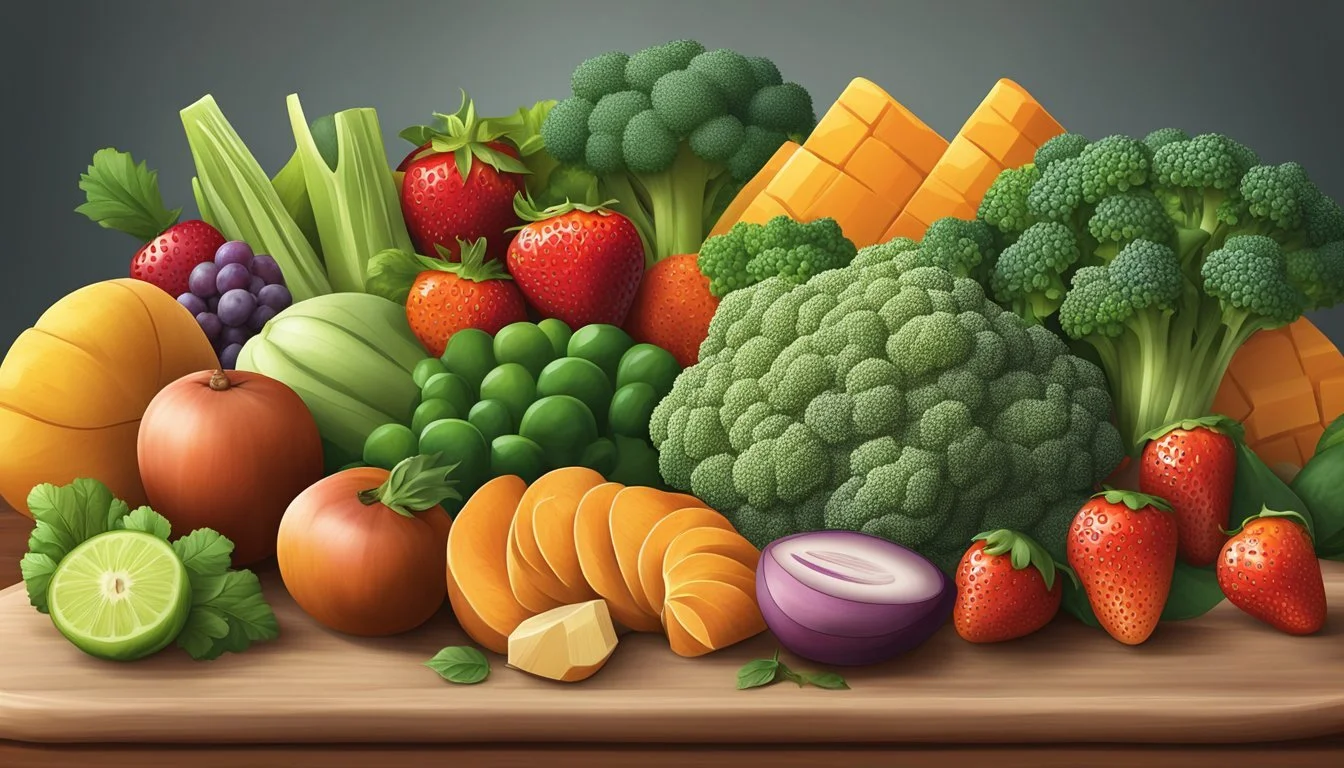Georgia Seasonal Fruit & Vegetables in February
Your Guide to Fresh Produce
This Article is Part of our Georgia Seasonal Fruit & Veg Calendar
Georgia's agricultural climate provides an array of seasonal fruits and vegetables, with February offering a unique selection of produce that thrives in the cooler temperatures. The state's winter harvest includes a variety of hearty vegetables that are both nutritious and flavorful. Farmers and home gardeners alike make the most of this month to grow and harvest crops that are well-suited to the Georgian winter.
In February, the Georgian soil yields produce like Brussels sprouts and cabbage, both of which have a prolonged season extending beyond the winter months. Root vegetables such as carrots are also in prime harvesting condition, offering a sweet and earthy addition to the winter plate. Leafy greens like chard and collard greens (how long do collard greens last?) are also plentiful, serving as a testament to the region's ability to produce robust greens even in the chill of winter.
With shorter days and cooler nights, February in Georgia is not typically associated with an abundance of fruit (What wine goes well with fruit?); however, its seasonal vegetable offerings are diverse enough to provide local consumers with a variety of fresh and healthy options. As such, these winter crops are the focus of many a Georgia table, providing sustenance and flavor during the coldest months of the year.
Understanding Seasonality in Georgia
In Georgia, the climate's impact on agriculture is significant, with the seasonality of fruit and vegetable production varying across the state. Winter months, including February, see a different range of produce compared to the fall, spring, and summer seasons.
Winter:
During February, the state is still in the grip of winter. Despite the colder temperatures, Georgia farmers manage to provide a selection of seasonal produce.
The seasonality is influenced by regional differences within the state. The northern mountains experience a shorter growing season, while the coastal plains enjoy a longer and somewhat milder winter climate, allowing for an extended harvesting period.
Seasonal Produce in Winter:
Here are typical in season fruits and veggies you might find in Georgia during February:
Fruits:
Citrus fruits
Apples (late varieties)
Vegetables:
Greens (collards, mustard, kale)
Root vegetables (turnips, radishes)
Members of the onion family (leeks, shallots)
Knowing the seasonal produce available helps residents and businesses plan menus and shopping to support local agriculture and enjoy the freshest flavors. While the ground may still be cold, these fruits and vegetables have adapted to thrive, offering freshness even in the chill of February.
Winter Produce Highlights
February in Georgia is a month where the cold weather presents an array of seasonal produce with rich flavors and nutritional benefits.
Cruciferous Vegetables
Georgia's winter crop includes a variety of cruciferous vegetables known for their healthful attributes. Broccoli and cauliflower flourish during the cooler months, offering a wealth of vitamins, minerals, and dietary fiber. Cabbage and kale, also part of this vegetable family, can be found fresh in February, perfect for hearty stews and nutritious salads.
Root Vegetables
Root vegetables reach their peak in the heart of winter. Georgia's soil yields nutritious carrots and sweet potatoes, packed with beta-carotene. Other root vegetables such as turnips, parsnips, and the lesser-known celeriac are readily available. These vegetables are ideal for roasting or boiling and offer a comforting warmth to any dish.
Leafy Greens
Leafy greens such as spinach and collard greens thrive in the winter climate of Georgia. These greens are extremely versatile and can be used in a multitude of dishes, from warm soups to fresh salads. Lettuce and arugula also remain in season, continuing to bring a crisp freshness to February meals.
Citrus Fruits
Winter marks the season for Georgia's delightful array of citrus fruits. Lemons and grapefruit provide a zesty punch and a boost of Vitamin C during the colder days. Sweet varieties like oranges and blood oranges are also at their juiciest. Their bright flavors are a reminder of the sunny days ahead and make a great addition to breakfasts or desserts.
Selecting and Storing February Produce
In February, Georgia's climate accommodates a bounty of produce. When selecting vegetables such as lettuce, which is robust in colder temperatures, one should look for fresh, crisp leaves. The absence of wilting or browning edges suggests optimal freshness. Lettuce, being a staple for salads, should be consumed within a week and stored in the refrigerator to maintain its crispness.
Celery, available through February, is another versatile vegetable, ideal for both salads and side dishes. For celery, firm stalks and a bright green color indicate high quality. Wrap it in aluminum foil and refrigerate to extend its freshness.
Here is a guide for storing some common February produce:
Produce Selection Tips Storage Advice Lettuce Choose crisp leaves without browning. Refrigerate in a plastic bag for up to a week. Celery Look for firm stalks and a bright green color. Wrap in foil and refrigerate. Collard Greens Leaves should be deep green and firm. Store in the fridge in a bag for up to 5 days.
Collard greens, often enjoyed in hearty winter recipes, should exhibit a vibrant green hue and should be stored in a plastic bag in the fridge, where they can stay fresh for around five days.
Produce freshness greatly influences the taste and nutritive value of both raw and cooked dishes. Proper storage enhances shelf life and preserves the integrity of flavors. Consumers in Georgia can take full advantage of February's fresh seasonal selection by adhering to these selection and storage practices.
Preparation and Cooking Tips
With an abundance of produce in season in Georgia during February, including citrus fruits and a variety of vegetables, the culinary opportunities are numerous. Whether making a warm, comforting dish or a refreshing snack, there are several ways to prepare these seasonal ingredients to maximize flavor and nutrition.
Vegetable Dishes
In February, winter squash and root vegetables are prime candidates for a plethora of recipes. One can roast butternut or acorn squash to enhance their natural sweetness, which pairs well with a hint of cinnamon or nutmeg (how long does nutmeg last?). A vibrant balsamic glaze can bring a delightful tanginess to roasted vegetables, elevating a simple dish to something special.
For salads, incorporating fennel (how long does fennel last?) provides a crunchy and slightly sweet component. Fennel's anise-like flavor complements citrus well, making it an excellent addition to winter salads. It can be thinly sliced and added raw for a crisp texture, or braised for a more tender bite.
When it comes to herbs, utilize hearty winter herbs like rosemary and thyme in soups. They stand up well to slow cooking and impart a robust flavor to hearty vegetable stews and broths.
Fruit Dishes
Citrus fruits like lemons, limes, oranges, and grapefruits are at their peak in Georgia. Their zesty flavors are ideal for creating luscious fruit desserts. One can bake an orange olive oil cake that is moist and aromatic or a grapefruit brûlée that offers a delightful caramelized top.
Another way to enjoy these fruits is in smoothies, where they can be blended with other seasonal fruits for a refreshing drink packed with vitamins. Citrus segments tossed with honey and mint can serve as a simple yet vibrant dessert as well.
Citrus fruits also make excellent appetizers; one can prepare a citrus salad with a sprinkle of chili flakes and a dash of olive oil for an easy yet flavorful start to any meal.
Health Benefits of Seasonal Eating
Eating seasonally, particularly in Georgia during February, offers numerous health benefits. Seasonal greens and citrus fruits available during this month are not only at their peak of freshness but are also packed with essential vitamins and nutrients.
Greens, such as kale and collards, provide a high concentration of vitamins A, C, and K, as well as minerals like calcium and iron. These leafy vegetables support immune function, bone health, and blood clotting. They have antioxidant properties which can protect against chronic illnesses.
Citrus fruits like oranges and grapefruits flourish in February's mild Georgia climate. These fruits are abundant in vitamin C, which is vital for the immune system. They also contain flavonoids, compounds that contribute to heart health and may reduce inflammation.
Incorporating these seasonal offerings into one's diet can lead to a more diverse intake of nutrients. This diversity is linked to a lower risk of disease, as well as improved overall health.
Seasonal Produce Key Nutrients Health Benefits Greens Vitamins A, C, K, Iron, Calcium Immune support, bone health, antioxidant effect Citrus Fruits Vitamin C, Flavonoids Immune support, heart health, anti-inflammatory
Consumers also tend to get fresher produce when they choose seasonal items, ensuring optimal taste and nutritional value. When fruits and vegetables are eaten close to their harvest time, they often retain more of their nutritional content compared to produce that has been stored for long periods or transported over great distances.
Georgia's Seasonal Farming and Markets
Georgia boasts a rich tradition of cultivating and marketing seasonal produce through local farmers markets throughout the state. The local community benefits from the state's commitment to fresh, locally-sourced fruits and vegetables, even during the month of February.
Local Farmers Markets
Georgia's farmers markets serve as hubs for city and state residents to access a variety of fresh, seasonal produce directly from the growers. During February, while the range of available produce is more limited compared to the bountiful summer months, consumers can still find winter crops like collard greens, turnips, and sweet potatoes. The markets often act as community gathering spots, fostering relationships between farmers and consumers. They provide crucial infrastructures to help farmers market their produce locally, which supports the local economy and encourages sustainable food systems. The state operates a network of farmers markets that are notable for their contributions to over $1 billion in annual sales.
State Farmers Markets include:
Atlanta State Farmers Market
Augusta State Farmers Market
Macon State Farmers Market
Organic Farming Practices
Organic farming in Georgia adheres to practices that maintain and enhance ecological harmony. In February, farmers who utilize organic farming practices focus on maintaining the soil and preparing for the upcoming growing seasons. The absence of synthetic pesticides and fertilizers in organic produce appeals to a growing segment of the community that values sustainable and health-conscious farming techniques. Thus, organic selections are commonplace at local farmers markets and are indicative of the state's broader commitment to environmentally responsible agriculture. Organic farms across Georgia also play a pivotal role in educating the public about the benefits of organic farming for both health and the environment.
Incorporating Georgia Produce into Your Diet
February in Georgia offers a variety of fresh produce that can be incorporated into a clean eating regimen. Utilizing local fruits and vegetables not only supports the local economy but also ensures peak freshness and nutrition.
Vegetables: Winter greens like collard greens, kale, and mustard greens are in season. They can be used in hearty winter recipes such as stews and sautés. For a nutritional boost, one can add them to smoothies or make a side dish, sautéing them with garlic and olive oil.
Fruits: While fruit options may be limited during this month, citrus fruits like oranges are available and can provide a fresh, tangy flavor to various dishes or be enjoyed as a standalone snack.
Seasonal Recipe Ideas Ingredients Citrus Kale Salad Kale, orange segments, nuts (how long do nuts last?), vinaigrette Collard Green Wraps Collard greens, hummus, assorted vegetables Mustard Greens Stir-fry Mustard greens, garlic, soy sauce (how long does soy sauce last?), tofu (how long does tofu last?)
Incorporating these seasonal foods into one’s diet promotes a clean eating lifestyle. They can easily be integrated into meals, providing both nutrition and flavor. One can create balanced, wholesome meals by pairing these greens with lean proteins and whole grains.
For instance, the vibrant citrus provides a burst of vitamin C and can brighten up a winter salad or add zest to a marinade. Similarly, the robust flavors of seasonal greens can transform a simple dish into a nourishing meal, underscoring the importance of fresh, local produce in maintaining a healthy diet.









